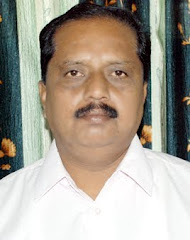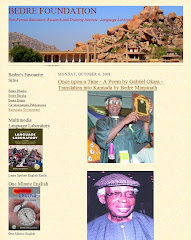11th November 2008
http://en.wikipedia.org/wiki/Maulana_Abul_Kalam_Azad_Institute_of_Asian_Studies,_Calcutta
GOVERNMENT OF INDIA HAS DECIDED TO OBSERVE 11th NOVEMBER, THE BIRTHDAY OF MAULANA ABUL KALAM AZAD, A GREAT FREEDOM FIGHTER, AN EMINENT EDUCATIONIST AND FIRST UNION MINISTER OF EDUCATION, AS ‘NATIONAL EDUCATION DAY’ EVERY YEAR FROM 2008 ONWARDS.
A brief biography is given here (From Wikipedia, the free encyclopedia).
For details, please visit the links povided on the top.
Abul Kalam Azad
Date of birth: 11 November 1888
Place of birth: Mecca, Ottoman Empire (now in Saudi Arabia)
Date of death: 22 February 1958
Place of death: Delhi, IndiaMovement: Indian independence movement
Major organizations: Indian National Congress
Maulana Abul Kalam Muhiyuddin Ahmed (11 November 1888 – 22 February 1958) was a Muslim scholar and a senior political leader of the Indian independence movement. He was one of the most prominent Muslim leaders to support Hindu-Muslim unity, opposing the partition of India on communal lines. Following India’s independence, he became the first Minister of Education in the Indian government. He is commonly remembered as Maulana Azad; he had adopted Azad (Free) as his pen name.As a young man, Azad composed poetry in Urdu as well as treatises on religion and philosophy. He rose to prominence through his work as a journalist, publishing works critical of the British Raj and espousing the causes of Indian nationalism. Azad became a leader of the Khilafat Movement during which he came into close contact with Indian leader Mahatma Gandhi. Azad became an enthusiastic supporter of Gandhi’s ideas of non-violent civil disobedience, and worked actively to organise the Non-cooperation movement in protest of the 1919 Rowlatt Acts. Azad committed himself to Gandhi’s ideals, including promoting Swadeshi (Indigenous) products and the cause of Swaraj (Self-rule) for India. He would become the youngest person to serve as the President of the Indian National Congress in 1923.Azad was one of the main organisers of the Dharasana Satyagraha in 1931, and emerged as one of the most important national leaders of the time, prominently leading the causes of Hindu-Muslim unity as well as espousing secularism and socialism. He served as Congress President from 1940 to 1945, during which the Quit India rebellion was launched and Azad was imprisoned with the entire Congress leadership for three years. Azad became the most prominent Muslim opponent of the demand for a separate Muslim state of Pakistan and served in the interim national government. Amidst communal turmoil following the partition of India, he worked for religious harmony. As India’s Education Minister, Azad oversaw the establishment of a national education system with free primary education and modern institutions of higher education. He is also credited with the foundation of the University Grants Commission, an important institution to supervise and advance the higher education in the nation.Azad’s family descended from a line of eminent Ulama or scholars of Islam, hailing from Herat in Afghanistan and had settled in India during the reign of the Mughal emperor Babur. His mother was of Arab descent, the daughter of Shaikh Muhammad Zahir Watri and his father, Maulana Khairuddin was of ethnic Persian origin[citation needed]. The family lived in the Bengal region until Maulana Khairuddin left India during the Indian rebellion of 1857 and settled in Mecca, the holiest city in Islam, where he met his wife.The family returned to Kolkata (then Calcutta) in 1890 where his father earned a reputation as a learned Muslim scholar. Azad’s mother died when he was 11 years old.Azad was raised in an environment steeped in Islamic religion. He was given a traditional Islamic education, tutored at his home and in the neighbourhood mosque by his father and later religious scholars.[1] Azad mastered several languages, including Urdu, Persian, Hindko, Arabic, and Hindi. He was also trained in the subjects of mathematics, philosophy, world history and science by reputed tutors hired by his family. An avid and determined student, Azad succeeded in completing the traditional course of study at the young age of sixteen, nine years ahead of his contemporaries. At the age of thirteen, he was married to a young Muslim girl, Zuleikha Begum. Azad was, more closer, a follower of the Deobandi school and compiled many treatises reinterpreting the Qur’an, the Hadith, and the principles of Fiqh and Kalam. A young man, Azad was also exposed to the modern intellectual life of Kolkata, the then capital of British-ruled India and the centre of cultural and political life. He began to doubt the traditional ways of his father and secretly diversified his studies. Azad learned English through intensive personal study and began learning Western philosophy, history and contemporary politics by reading advanced books and modern periodicals. Azad grew disillusioned with Islamic teachings and was inspired by the modern views of Muslim educationalist Sir Syed Ahmed Khan, who had promoted rationalism. Increasingly doubtful of religious dogma, Azad entered a period of self-described "atheism" and "sinfulness" that lasted for almost a decade.Azad developed political views considered radical for most Muslims of the time and became a full-fledged Indian nationalist. He fiercely criticised the British for racial discrimination and ignoring the needs of common people across India. He also criticised Muslim politicians for focusing on communal issues before the national interest and rejected the All India Muslim League’s communal separatism. Azad developed curiosity and interest in the pan-Islamic doctrines of Jamal al-Din al-Afghani and visited Afghanistan, Iraq, Egypt, Syria and Turkey. But his views changed considerably when he met revolutionary activists in Iraq and was influence by their fervent anti-imperialism and nationalism. Against common Muslim opinion of the time, Azad opposed the partition of Bengal in 1905 and became increasingly active in revolutionary activities, to which he was introduced by the prominent Hindu revolutionaries Sri Aurobindo and Shyam Sundar Chakravarthy. Azad initially evoked surprise from other revolutionaries, but Azad won their praise and confidence by working secretly to organise revolutionaries activities and meetings in Bengal, Bihar and Mumbai (then Bombay).Azad’s education had been shaped for him to become a cleric, but his rebellious nature and affinity for politics turned him towards journalism. He established an Urdu weekly newspaper in 1912 called Al-Hilal and openly attacked British policies while exploring the challenges facing common people. Espousing the ideals of Indian nationalism, Azad’s publications were aimed at encouraging young Muslims into fighting for independence and Hindu-Muslim unity. His work helped improve the relationship between Hindus and Muslims in Bengal, which had been soured by the controversy surrounding the partition of Bengal and the issue of separate communal electorates.With the onset of World War I, the British stiffened censorship and restrictions on political activity. Azad’s Al-Hilal was consequently banned in 1914 under the Press Act. Azad started a new journal, the Al-Balagh, which increased its active support for nationalist causes and communal unity. In this period Azad also became active in his support for the Khilafat agitation to protect the position of the Sultan of Ottoman Turkey, who was the caliph for Muslims worldwide. The Sultan had sided against the British in the war and the continuity of his rule came under serious threat, causing distress amongst Muslim conservatives. Azad saw an opportunity to energise Indian Muslims and achieve major political and social reform through the struggle. With his popularity increasing across India, the government outlawed Azad’s second publication under the Defence of India Regulations Act and arrested him. The governments of the Bombay Presidency, United Provinces, Punjab and Delhi prohibited his entry into the provinces and Azad was moved to a jail in Ranchi, where he was incarcerated until January 1, 1920.


 SSLC examinations - 2009
SSLC examinations - 2009 

















